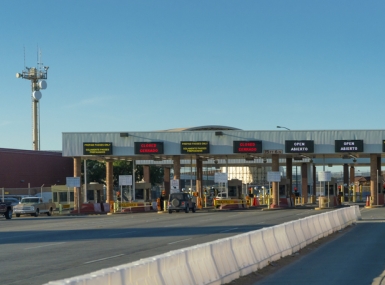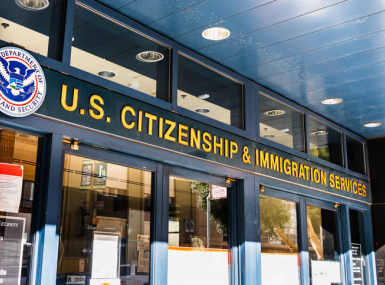Immigration Reform Task Force
About the Task Force
Given the central role of county governments in ensuring the health and safety of all members of local communities, county leaders are important stakeholders in discussions related to federal immigration policies. The National Association of Counties’ (NACo) Immigration Reform Task Force provides a forum for county officials from across the nation to discuss the impact of federal immigration policy on local governments and communities, and to engage with federal decision makers on matters related to immigration. The Task Force is also charged with advising NACo’s ten policy steering committees on federal immigration issues.
To carry our this objective of informing NACo’s policy steering committees, from 2018 through 2020, NACo’s Immigration Reform Task Force worked in a bipartisan manner to develop and fine-tune immigration consensus principles. Once agreed to, Task Force members then translated these principles into actionable policy resolutions through NACo’s comprehensive policy process. The policy resolutions, which were originally adopted by NACo at the 2019 Legislative Conference, highlight how counties continue to be impacted directly by federal immigration policies and practices. During the 2022 Annual Conference, a number of longstanding immigration resolutions were adopted as permanent platform language.
The County Role in Immigration
Congress has debated comprehensive immigration reform for almost a decade, balancing the need to reform the immigration system with increased border security concerns. In the debate over immigration reform, the county perspective is often overlooked; yet, from an operational and managerial standpoint, counties are central players. As administrators of numerous federal benefits programs and front-line providers of the public’s health and safety, counties continue to be impacted directly by federal immigration policies and practices.
Nationally, counties invest $83 billion annually in community health for more than 300 million residents nationwide. Through 961 county-supported hospitals, 883 county-owned and supported long-term care facilities, 750 county behavioral health authorities and 1,943 county public health departments, counties deliver health services to millions of individuals. From preventative measures like administering flu shots to educating the public on health issues and other diseases, counties are involved in protecting the health of all individuals. Counties play a major role in providing health care to individuals, often serving as the health care providers of last resort for the uninsured and underinsured regardless of their immigration status as mandated by federal and state laws and policies
Maintaining safe communities is one of the most important functions of county governments. Counties invest over $70 billion annually in providing justice and public safety services to all residents, working together with all levels of government to improve public safety, safely reduce jail populations and fight recidivism. Additionally, counties are often involved in the apprehension and detention of undocumented immigrants at the request of our federal agency partners.
Counties fund and administer federal, state and local service systems and play a pivotal role in providing all residents with critical health and human services to break cycles of poverty. Each year, counties invest $58 billion in federal, state and local funds in human services while serving as the front-line social safety net for residents.
Task Force Consensus Principles
To inform and guide the Task Force’s policy discussions and recommendations to NACo’s policy steering committees,
Task Force members have developed the following consensus immigration principles.
Public safety is an overarching and principal duty of counties, and local officials support law enforcement and the rule of law. Federal courts have concluded that immigration enforcement is a federal responsibility, but when it comes to dealing with immigrants who encounter the criminal justice system, counties increasingly face various and often conflicting pressures, including costly litigation as a result of compliance with the United States Constitution rights and processes, threats against critical federal funding streams and community protests.
Therefore, counties recognize the federal government’s authority to effectively enforce federal immigration laws while both maintaining continued local control over community resources and public safety priorities as well as providing reimbursements to counties for any costs incurred while complying with federal immigration policies.
Although immigration is a federal responsibility, inaction by Congress and shifting federal administrative policies have created confusion and uncertainty for county governments, who must provide for the well-being and safety of all members of our communities, including immigrant populations.
Therefore, NACo calls on Congress to put aside political differences and urgently come to agreement on meaningful immigration legislation that provides clarity at the local level, helps counties work with federal partners on immigration issues while serving the needs of all residents, and improves and streamlines the executive branch’s management of the legal immigration system.
Immigrants largely come to America seeking opportunity, and immigrant labor and expertise is vital to local economies and industries in most states across the country. Counties have an interest in ensuring that our employers and industries of all types can hire and retain a qualified and legal workforce that meets their needs and helps to strengthen local economies.
Therefore, federal laws should not only maintain legal immigration levels, but also support and provide legal avenues for immigrants who wish to come to the United States, both permanently and temporarily, and allow these individuals to contribute their skills and expertise to our economies and to maintain a sufficient workforce.
Counties across the nation fund and administer federal, state and local programs that support the health and successful development of all residents, including immigrant populations. Federal immigration policies that impact families or children can unintentionally affect the ability of counties to provide supportive services to residents, often resulting in additional strain to local budgets.
Therefore, counties urge the federal government to carry out its enforcement of immigration law in a humane manner that minimizes negative impacts, including possible separations on families and children and does not increase reliance on local social safety- net services or create new demands and administrative costs for counties without adequate resources and funding from the federal government.
Related Topics
Task Force Contact









